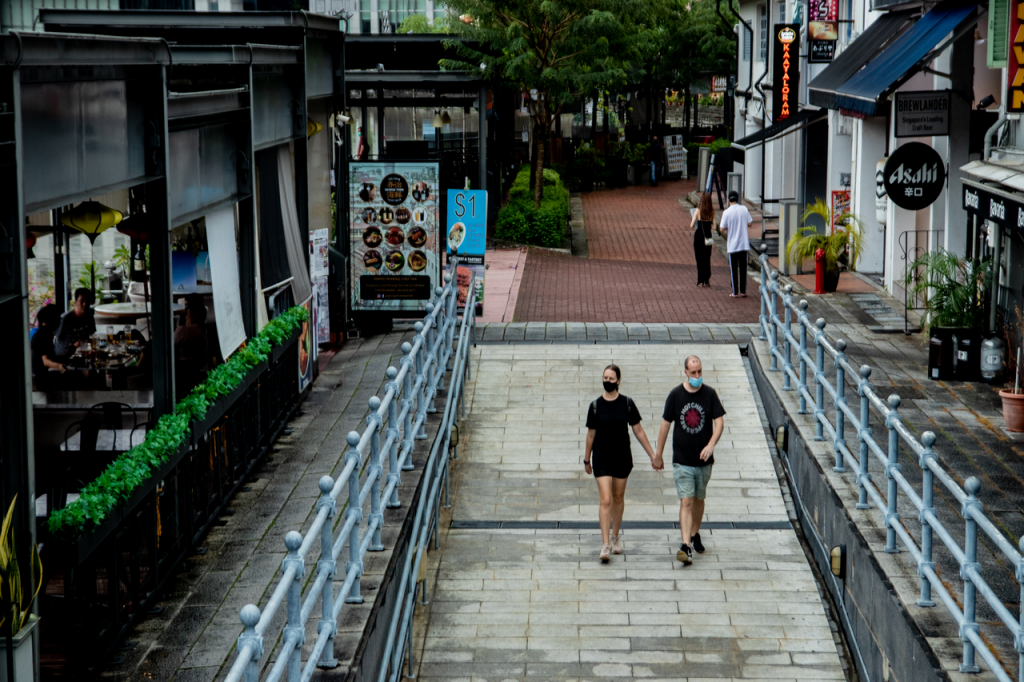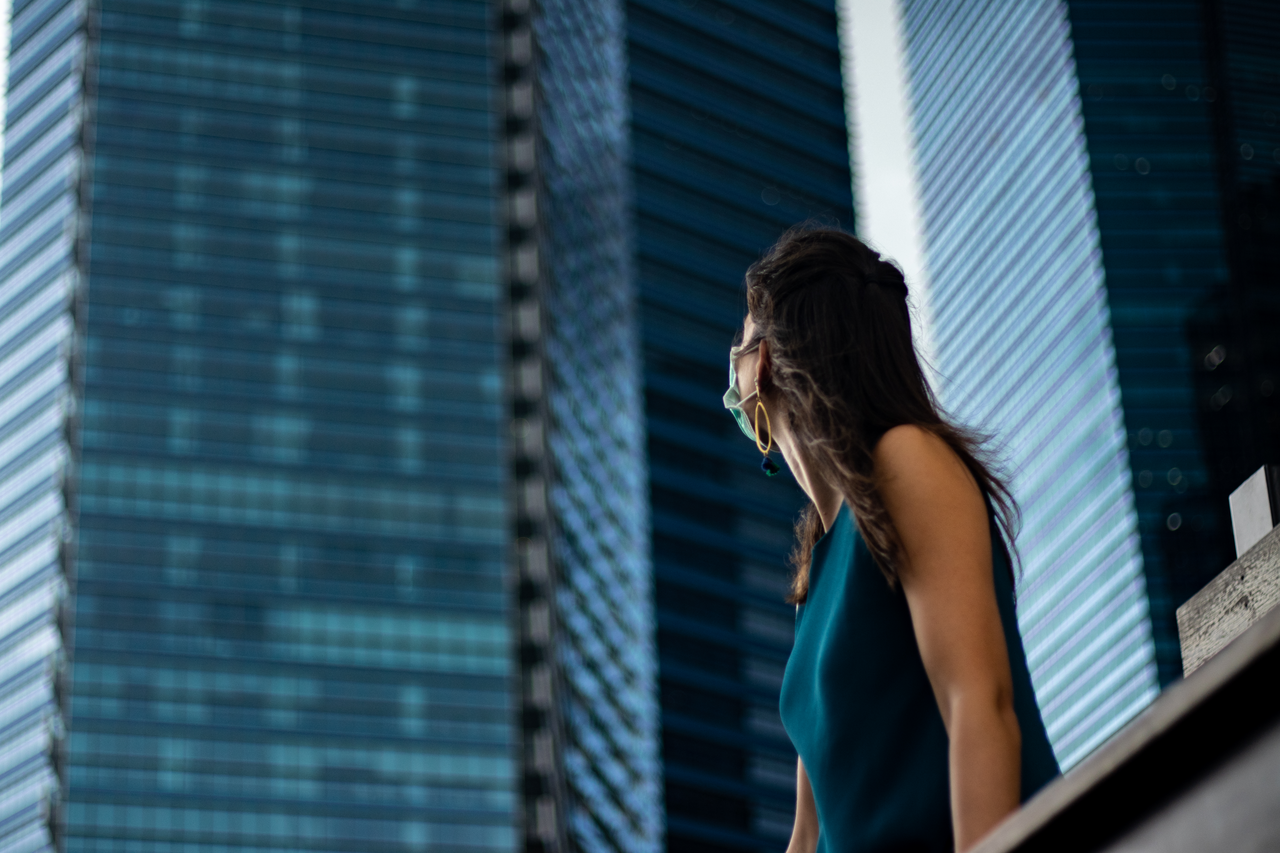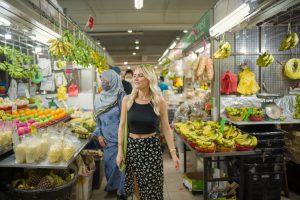All images by Liang Jin Tey unless otherwise stated.
“I will never live in Singapore as an expat again.”
Quinn’s sojourn to Singapore—with a family of six, including two young children—has been fraught, to say the least. Earlier this year, it was pushed to an unpleasant end by an incident at Changi Airport, after which, she decided her family had little choice but to leave the island state.
ADVERTISEMENT
Her story grazes on issues that are central to endemic Singapore: guest vs host, border restrictions, the inordinate focus on process. At the moment, there’s chatter about what an endemic Singapore could look like. But Singapore hasn’t yet settled on a version that is progressive and cautious—increasingly, it seems some dramatic action is required, lest we languish eternally. In recent weeks, there have been some tentative steps towards a progressive reopening, such as the announcement of the F1 hosting contract renewal.
However, nothing has changed.
Although our vaccination and booster rates are extraordinarily high, and Omicron is definitively less severe, we are still clutching onto senseless restrictions. How can we pledge to revive a cosmopolitan extravaganza like the F1 night-race while outlawing live sports and music and enforcing an informal 10.30 PM curfew?

This is perplexing for Quinn and other expats who haven’t experienced Singapore in its pre-2020 iteration. What she’s noticed throughout her time here (that Singaporeans know all too well) is intolerance for mishaps in the process. By process, I’m referring to the COVID protocols we’ve adopted in the last two years. People make mistakes. We are not machines. And yet, there’s an expectation that we follow the fluctuating processes perfectly and without question.
There are obvious consequences for failing to follow the rules. Fines, jail time, social media shaming. But there’s another consequence that we haven’t quite understood: how the culture of process has increased civilian-on-civilian surveillance and damaged our ability to coexist peacefully.
When we were restrictionless
Quinn and her husband Michael, who are in their mid 40’s, are no strangers to adventure. By now, they are career expats who have spent most of their married life away from their home in Europe. Quinn grew up in the United Arab Emirates (UAE) due to her father’s job, and the couple relocated there on account of Michael’s job before coming to Singapore. Two of their children were born abroad in their decade-long migration.
Though they were enamoured with the UAE, Quinn and Michael jumped at the chance to live in Singapore when an intra-company transfer arose in late 2019.
“It seemed like a great place to base ourselves and explore the region. Plus, Singapore is so diverse and rich in culture. I wanted my kids to experience the melting pot.”
For a short period at the beginning of 2020, the family soaked in their new life. Quinn often encountered questions from curious Singaporeans about her husband’s ‘expat package’—which she says, doesn’t exist. She hadn’t heard of the term before she came to Singapore. Over time, Quinn gathered that locals presumed all her living costs (and then some) were covered by her husband’s company—on top of a cushy salary.
“That doesn’t happen. We have lots of expat friends—many of whom have a higher income than us—and they don’t have a package. My husband makes a decent salary, but we pay for everything out of pocket. Because we’re not PR’s we don’t qualify for the various government subsidies. This adds up with medical care, education, buying medications, and such.”
ADVERTISEMENT
Singapore has turned out to be more expensive than expected. They’ve made a significant dent in their savings after two years of living here. Quinn and Michael haven’t lived large in Singapore. They live in the heartlands, eat at the hawker centre, and don’t own a car. Their biggest expense was the international school fees for four children.
At the end of last year, Quinn outlined their anticipated costs vs the actual costs they encountered on the ground. She realized it was financially imprudent to stay in Singapore for much longer. They couldn’t save any money.
Us Vs Them
At first, Quinn’s experience with her condo friends made her optimistic about integrating with the locals. Her neighbours were friendly and welcoming. If everyone were half as nice as this, she thought, Singapore could be a longer-term home than they’d imagined.
Then the pandemic happened. During the initial lockdown, she donated food goods to the migrant worker’s dormitory. She was heartened and impressed by the enthusiastic team of volunteers when she showed up to contribute.
“Some politician arrived with a photographer, and the photographer asked me to step out of the picture. A fellow volunteer approached me later and guessed this was because it doesn’t ‘look good’ for an expat to be helping out,” Quinn sighed.
“That’s when I began to notice this us vs them mentality.”
Breaking point, part one
“We haven’t had a meal together in a very long time.”
With an odd number of six, it’s been tricky for Quinn’s family to spend time together outside of the home. It’s especially challenging for the two younger children, who don’t fully understand the restrictions—explaining why they have to walk in the park in two separate groups with their family, is hard to digest.

“I’ve seen locals walking in bigger groups beyond the capacity limit. I never begrudge them for it, and I’d like to do that too while outside, but as I quickly found out—for some reason, we are held to a higher standard.”
One afternoon in the middle of 2021, when dine-out capacity was capped at five, the family went for an afternoon walk and a quick meal at an open-air food court. It was bustling and several family units were eating together—some with seven or more, according to Quinn. The couple dutifully split their family between two tables. When Michael went off to the bathroom, the little kids needed help getting food on their plate—so, while masked, Quinn walked over and assisted them, wiping their faces and hands with a wet towel.
“All of a sudden, a Singaporean woman comes over to me, screaming and yelling that we’d broken the law and we know exactly what we are doing. She had recorded me and my children and she humiliated me by shouting and showing off the video.”
Quinn felt her anger rising. She felt unfairly targeted by the woman, as all around them, local families were doing the same thing—taking care of seniors and little children, with little regard for the ‘mingling’ rules. They were outside after all. Eventually, a Singaporean man came over and told the woman who recorded Quinn to knock it off.
“It was after this incident, and seeing hundreds of videos recorded of foreigners online, that made me feel as though we were expected to follow the rules more closely than the locals. My children were so embarrassed and upset by the hostility.”
The last straw
For most expats, border restrictions were the harshest reality of the pandemic. Irreplaceable life events were robbed: births, funerals, marriages, reunions. Quinn missed her ageing parents and her siblings terribly. She noticed that her local friends weren’t sympathetic to her plight. She described their nonchalance as such: expats are considered lucky to be in Singapore, and should simply put up with whatever hardship ensues as a result.
In December 2021, Quinn and Michael decided that after two years of isolation in a new country; they had to go home. They booked flights for everyone in the family and left for a vacation in Europe that was sorely needed.
There’s a lot of documentation needed to travel at the moment—test records, vaccination certificates. But back in January, for work pass holders there was an additional hurdle: re-entry approval, which Quinn and Michael duly secured from MOM before leaving for their vacation. It’s important to note that as of 21 February 2022, this is no longer the case.
Chaos on arrival
When Quinn and Michael tried to re-enter Singapore after their holiday—with pre-entry approval—they were escorted to the main immigration desk. According to Quinn, the officer who attended them there told them that there was a problem with their re-entry documentation.
Still, after a few hours of pleading with various immigration officials and calling their embassy and HR representatives, Quinn, Michael, and their four children were denied entry to Singapore. They boarded a flight back to their layover destination to pursue further documentation and apply for re-entry yet again.
Quinn tried appealing emotionally to the officers, who were, in her opinion, “as confused as we were about why they wouldn’t let six legal residents back into their home.” She felt as though the process was unnecessarily complex and somewhat accusatory.
“I honestly felt I was treated like a criminal,” she said while recounting her frustration.
This palaver was an emotional and financial drain. It solidified a learning that Quinn first felt in 2021: in Singapore, expats were seen as adversaries and interlopers, not friends and guests.
Greener pastures
Their layover destination was, thankfully for Quinn and Michael, in the UAE. There were friends to stay with and Michael’s employer had an office there. Ultimately, this accidental detour—when they were denied entry from their home, Singapore—clarified their future intentions.
“When we arrived in the UAE, we were welcomed with open arms. The process was simpler and we had more than enough documentation to enter the country. In Singapore, I was treated like I did something wrong. And no one could tell me exactly what that was.”
Michael was so dismayed by the situation that he vowed not to return to Singapore. To date, he has stayed in the UAE. Together, Quinn and Michael decided they would tie up their loose ends in Singapore and restart their life in the UAE.
After a few days in the UAE, Quinn re-applied for re-entry approval through her husband’s company and flew back to Singapore with her children, and after another delay at immigration, was finally permitted to go home.
The most maddening part of it all? Her documentation looked to her to be exactly the same as what she brought the first time around.
Foreigner’s exodus: only a matter of time
It’s shooting the low-hanging fruit to say that foreigners are fleeing Singapore solely due to the pandemic restrictions. Though certainly, the intense protocols have put some expats off for good. In 2021, there was a fervent discourse on the role of various migrants in society and whether or not they add value or belong in the country.
As we know from history, the outsider is walloped with blame in moments of national strife. The xenophobic vitriol that arose from the CECA debate last year is an example of this.
Quinn’s story suggests that Singapore is less welcoming to foreigners in 2022. The tendency to snitch on and police each other is a new virus to be tackled. And of course, the brunt of this surveillance is placed on the outsiders. If social media is the measure of public opinion, there’s a voracious appetite for expat schadenfreude––citizens take pleasure in sharing the news of a foreigner who is fined or deported for breaking COVID rules.
For people like Quinn, who tried in earnest to call Singapore home, citizen surveillance and her inevitable failure to abide perfectly by the rules has taken their toll. Her ability to connect with the local people and trust the processes and systems in place was eroded.
So, what makes a good immigrant? The goalposts move endlessly. One day it’s nationality, the next it’s income, and then it’s industry. An underbelly of resentment invades this question. In a certain sense, it rightfully asserts sovereignty—Singapore has accomplished extraordinary things in a short period of time. However, Singaporeans are forgetful about who helped along the way. Be it the foreign workers who construct the award-winning buildings, or the domestic helpers who raised generations of Singaporeans.
If Singapore keeps narrowing the criteria and turning the nose up at the ‘outsiders’, one day it will face a thorny question: What makes this nation a good host country? And after icing out the foreigners, how can they be convinced to come back?
If you haven’t already, follow RICE on Instagram, Spotify, Facebook, and Telegram. If you have a lead for a story, feedback on our work, or just want to say hi, you can also email us at community@ricemedia.co.






